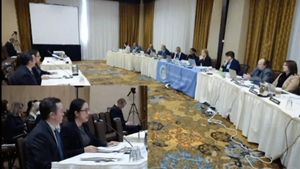California is at the crossroads of urgent water management reform as the Newsom administration pushes forward with new regulations aimed at balancing the conflicting needs of agriculture and environmental conservation. This proposed framework for managing the state’s Delta water resources has garnered both widespread support from farmers and cities, and staunch opposition from environmentalists concerned about the plight of Chinook salmon.
Backed by more than $1 billion in state funds, the administration's rules seek to reshape how farms and municipalities draw water from the Central Valley’s Delta, and aim to restore depleted salmon populations. Recent discussions have turned increasingly contentious as stakeholders examine the potential impact of these reforms, originally proposed to aid the recovery of California’s iconic salmon.
While the administration touts the proposal as part of a long-term effort to double Chinook populations by 2050, environmental groups have almost unanimously rejected the idea. They warn the plan, dubbed “Healthy Rivers,” lacks the necessary safeguards and resources to achieve meaningful environmental gains. Jon Rosenfield, science director with San Francisco Baykeeper, firmly states, “There is no way the assets they’ve put on the table, water and habitat combined, are going to achieve the doubling goal — no way, not possible.”
The Healthy Rivers initiative, also known as the “voluntary agreements,” is one of two proposed pathways for revising the Bay-Delta Water Quality Control Plan, which has remained unchanged since its last overhaul in 1995. This update is seen as pivotal for determining how much water is allocated for agricultural use versus environmental needs, particularly for salmon and other species facing existential threats.
The salmon population has been on the decline for decades due to various factors, including dam operations, water diversions, and increasing water temperatures. Alarmingly, all commercial and recreational salmon fishing was banned for two consecutive years due to dwindling numbers, and forecasts for this year suggest no signs of recovery. “Today, I am committing to achieving a doubling of California’s salmon population by 2050,” said Governor Gavin Newsom, underscoring the seriousness of the administration's intention. Yet, the jump-start from these proposals remains under scrutiny.
Conservation advocates argue the current strategy allows excessive water diversion, which could lead to even deadlier conditions for salmon populations. Gary Bobker, program director at Friends of the River, emphasized the detrimental outcome of excessive water extraction by stating, “If you’re diverting more than half of a river’s flow, you are guaranteeing negative population growth” of salmon.
California’s water districts, which serve millions, have thrown their weight behind the state’s proposed plan, asserting it can maintain water supply and help rejuvenate the ecosystem simultaneously. Wade Crowfoot, California Resources Secretary, described the initiative as “a new and strengthened approach” to support both the environment and communities throughout California.
Despite the state’s optimism, critics maintain the proposed rules do not nearly meet the demands for the rivers or the growing salmon populations. Some believe the plan will lead to continued water shortages for the rivers during critically dry seasons, exacerbated by potential loopholes for future water projects.
Current discussions also highlight differing strategies: the state water board has the option to implement strict minimum flows to protect the river ecosystems, which proponents claim would negatively impact agricultural operations. “The only people at the table talking about the voluntary agreements are water agencies and contractors, excluding tribes and vulnerable communities,” says Gary Mulcahy, representative for the Winnemem Wintu Tribe, whose livelihood historically centered on Chinook salmon.
On the economic front, the repercussions of adopting either strategy could be vast. Farmers could face substantial water shortages, with potential losses of over a quarter of their supplies during dry years, translating to significant losses. With California agriculture already strained by drought conditions, the decision looms large over the livelihood of many.
While some scientists remain hopeful about the Healthy Rivers program, they stress the need for future adaptability. Louise Conrad, lead scientist at the Department of Water Resources, expressed this faith, hoping to reach 25% of the doubling goal after eight years. Yet, anxieties about the timeline resonate, leading to questions about whether this is sufficient time to reverse the trend of decline for salmon.
The upcoming public hearing by the State Water Resources Control Board, likely slated for 2025, will provide the arena for debate over these proposals. Water users and environmental advocates alike await the ruling, as it can shape California's water future significantly, both for its people and its wildlife.
Overall, California's new Delta water plan exemplifies the tricky balance between resource management and environmental stewardship. The dual aim of safeguarding salmon habitats alongside agricultural water supplies encapsulates the broader conflict over natural resources, reflecting the pressing climate challenges faced by the state. The story of California’s water policy continues to evolve, and it will take collective commitment from various stakeholders to find genuine solutions and avoid the potential extinction crises faced by the salmon and other native species.



